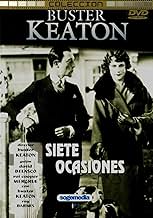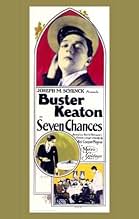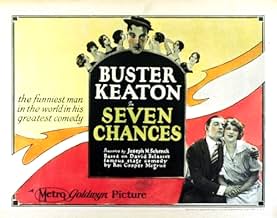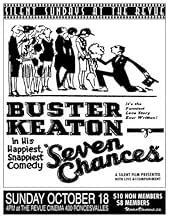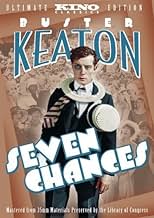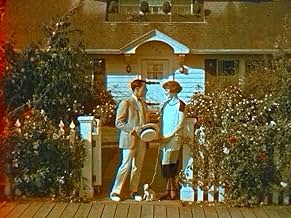NOTE IMDb
7,8/10
13 k
MA NOTE
Un homme apprend qu'il héritera d'une fortune s'il se marie avant 19 heures le jour même.Un homme apprend qu'il héritera d'une fortune s'il se marie avant 19 heures le jour même.Un homme apprend qu'il héritera d'une fortune s'il se marie avant 19 heures le jour même.
- Réalisation
- Scénario
- Casting principal
- Récompenses
- 1 victoire et 1 nomination au total
Frances Raymond
- Her Mother
- (as Frankie Raymond)
Jean Arthur
- Miss Smith - Office Receptionist
- (non crédité)
Lori Bara
- Mother of Underage Girl
- (non crédité)
Rosalind Byrne
- Hat Check Girl
- (non crédité)
Louise Carver
- Prospective Bride Who Operates Crane
- (non crédité)
Avis à la une
This film might seem familiar, as it has been remade several times--the last time just a few years ago. Buster Keaton stands to inherit a fortune providing he marries before time expires. But, he has no prospects and time is running out--what to do, what to do? Well, he tries again and again and again with no luck. That is until the ladies find out about the fortune that awaits them as his bride. Then, EVERYONE under the sun comes out of the woodwork--all ages, races and sizes. And, because so much money is involved, it goes from being a cute comedy to complete pandemonium! These women WON'T take no for an answer and they are super-dooper aggressive--and Buster runs for his life! Well, the ladies aren't about to let their fortune get away and hundreds of maniacal brides-to-be (all in white) give chase--resulting in one of the funniest chases in film history. What happens next is for you to see for yourself. It's funny, well-made and fast paced fun.
I'm sorry to hear that Keaton didn't care for this film, because it was a truncated version of this film that introduced me to Buster Keaton when I was about six.
When the film gets going, it really takes off and I mean off the ground. The big chase in this film is a joy to see.
This is a must see Keaton film.
When the film gets going, it really takes off and I mean off the ground. The big chase in this film is a joy to see.
This is a must see Keaton film.
Contrary to what you may have read, "Seven Chances" (1925) was made before Buster Keaton signed with MGM and relinquished artistic control over his own films. His gifts of extraordinary agility, timing, and visualizing the comic potential in the most mundane situations are everywhere in evidence.
The plot of "Seven Chances" is ancient. A young bachelor stands to inherit millions if he can find a bride by a certain day and marry at a certain hour. The date is invariably the same as the day the will is read, and in the hands of Keaton, his writers and cast, the comic possibilities are brilliantly exploited. The same premise was the basis for at least three other films before Keaton's, and was remade (abysmally -- from what I've read) as "The Bachelor" with Chris O'Donnell in 1999. The chain of events that flows from news of the inheritance just builds and builds over the course of the film, the gags growing increasingly clever as time grows shorter. "Seven Chances" clocks in at less than an hour, but the final 15 minutes (which Buster Keaton reportedly reworked several times) are among the most hilarious in all of silent film, perhaps in the history of screen comedy.
Initially, only Buster, his business partner (T. Ray Brown) and the lawyer (Snitz Edwards, who was so terribly homely he was cute) are aware of the dilemma. After Buster botches a proposal to his longtime girlfriend, (Ruth Dwyer), he pops the question to several more female acquaintances, with predictably embarrassing results. It is then that Brown and Edwards (unbeknownst to Buster) decide to place a newspaper announcement advertising his plight.
Once the newspapers hit the streets, the chase is on. Keaton is pursued through 1920s Los Angeles by dozens, then scores, then seemingly hundreds of would-be brides. They come in all ages, shapes and sizes, makeshift veils trailing after them. No obstacle is too great in their pursuit to beat out each other for the prize of marriage to a man they don't even know, and Buster throws out plenty of roadblocks in his wake.
In 1979, Walter Kerr wrote the definitive book on silent comedies, "The Silent Clowns." One of the jacket blurbs reads, "I found myself laughing out loud at routines from movies I have never seen." I don't have Kerr's gift, but I can tell you that "Seven Chances" is the most consistently funny movie Buster Keaton ever made. All of his movies include inventive sight gags, but "Seven Chances," more than most of Buster's movies, relies on character comedy as well as situational comedy for its humor. And it scores a bull's eye on both. A sheer delight.
The plot of "Seven Chances" is ancient. A young bachelor stands to inherit millions if he can find a bride by a certain day and marry at a certain hour. The date is invariably the same as the day the will is read, and in the hands of Keaton, his writers and cast, the comic possibilities are brilliantly exploited. The same premise was the basis for at least three other films before Keaton's, and was remade (abysmally -- from what I've read) as "The Bachelor" with Chris O'Donnell in 1999. The chain of events that flows from news of the inheritance just builds and builds over the course of the film, the gags growing increasingly clever as time grows shorter. "Seven Chances" clocks in at less than an hour, but the final 15 minutes (which Buster Keaton reportedly reworked several times) are among the most hilarious in all of silent film, perhaps in the history of screen comedy.
Initially, only Buster, his business partner (T. Ray Brown) and the lawyer (Snitz Edwards, who was so terribly homely he was cute) are aware of the dilemma. After Buster botches a proposal to his longtime girlfriend, (Ruth Dwyer), he pops the question to several more female acquaintances, with predictably embarrassing results. It is then that Brown and Edwards (unbeknownst to Buster) decide to place a newspaper announcement advertising his plight.
Once the newspapers hit the streets, the chase is on. Keaton is pursued through 1920s Los Angeles by dozens, then scores, then seemingly hundreds of would-be brides. They come in all ages, shapes and sizes, makeshift veils trailing after them. No obstacle is too great in their pursuit to beat out each other for the prize of marriage to a man they don't even know, and Buster throws out plenty of roadblocks in his wake.
In 1979, Walter Kerr wrote the definitive book on silent comedies, "The Silent Clowns." One of the jacket blurbs reads, "I found myself laughing out loud at routines from movies I have never seen." I don't have Kerr's gift, but I can tell you that "Seven Chances" is the most consistently funny movie Buster Keaton ever made. All of his movies include inventive sight gags, but "Seven Chances," more than most of Buster's movies, relies on character comedy as well as situational comedy for its humor. And it scores a bull's eye on both. A sheer delight.
Buster Keaton's comic genius makes "Seven Chances" a wildly entertaining film. The first half of it is quite good, if imperfect, but the second half is a tour-de-force of sustained humor and creativity. Keaton plays Jimmie Shannon, a young man who learns that he stands to inherit a fortune, but only if he marries by 7 PM that very day. It's the kind of goofy premise that in lesser hands could be a complete flop, but Keaton gets all kinds of possibilities out of it.
For most of the first half of the film, Jimmie is busy racing around proposing to every woman he can find. His true love, Mary, tries to find Jimmie herself, but he is already off on his frantic search for someone to accompany him to the altar. The search is always funny, at times extremely so. This first half has a handful of things that don't quite work, such as the black-faced servant (who was, though, probably intended as a sympathetic character), but if it were not for that and a couple other small details, this would be a nearly perfect film.
In the second half, all of the complications set up a frantic chase sequence, with literally hundreds (at least) of angry women pursuing Jimmie through the city, while he tries to get to Mary. This might be the best comic chase sequence ever filmed. It is hilarious and incredibly inventive, with careful choreography, a great variety of backgrounds, and a huge collection of gags both obvious and subtle. No description could do it justice - it has to be seen at least once to appreciate it.
If you are a fan of Keaton or of silent films in general, make sure to see this one.
For most of the first half of the film, Jimmie is busy racing around proposing to every woman he can find. His true love, Mary, tries to find Jimmie herself, but he is already off on his frantic search for someone to accompany him to the altar. The search is always funny, at times extremely so. This first half has a handful of things that don't quite work, such as the black-faced servant (who was, though, probably intended as a sympathetic character), but if it were not for that and a couple other small details, this would be a nearly perfect film.
In the second half, all of the complications set up a frantic chase sequence, with literally hundreds (at least) of angry women pursuing Jimmie through the city, while he tries to get to Mary. This might be the best comic chase sequence ever filmed. It is hilarious and incredibly inventive, with careful choreography, a great variety of backgrounds, and a huge collection of gags both obvious and subtle. No description could do it justice - it has to be seen at least once to appreciate it.
If you are a fan of Keaton or of silent films in general, make sure to see this one.
Desperate for money to save his failing business, junior stockbroker Buster Keaton (as James "Jimmie" Shannon) is understandably pleased to learn his recently deceased grandfather has tentatively left him $7 million. In order to inherit the money, Mr. Keaton must get married by 7 pm. After a misunderstanding with girlfriend Ruth Dwyer (as Mary Jones), Keaton gets "Seven Chances" to propose, but each woman turns him down. When a newspaper article reveals Keaton's potential, every woman in the vicinity decides to pursue him. Keaton decides marrying Ms. Dwyer is the correct way to go, if he can get away from a landslide of eager women...
Lost on modern audiences is a moment when Keaton visits a theater to propose marriage to a showgirl, who we're told is Julian Eltinge; filmgoers in 1925 would have known this was a female impersonator. Another of Keaton's prospects in young Jean Arthur (as "Miss Smith"). The colorful opening gives "Seven Chances" a great start, but frequent "ethnic" humor is not funny. It's hard to believe Keaton considered this film substandard. Even before it gets going, it's a top quality production. There are enough chuckles before the famous chase scene, which really begins when Keaton falls asleep in church and the women start rushing to meet him.
******** Seven Chances (3/11/25) Buster Keaton ~ Buster Keaton, Ruth Dwyer, Snitz Edwards, T. Roy Barnes
Lost on modern audiences is a moment when Keaton visits a theater to propose marriage to a showgirl, who we're told is Julian Eltinge; filmgoers in 1925 would have known this was a female impersonator. Another of Keaton's prospects in young Jean Arthur (as "Miss Smith"). The colorful opening gives "Seven Chances" a great start, but frequent "ethnic" humor is not funny. It's hard to believe Keaton considered this film substandard. Even before it gets going, it's a top quality production. There are enough chuckles before the famous chase scene, which really begins when Keaton falls asleep in church and the women start rushing to meet him.
******** Seven Chances (3/11/25) Buster Keaton ~ Buster Keaton, Ruth Dwyer, Snitz Edwards, T. Roy Barnes
Le saviez-vous
- AnecdotesBuster Keaton had this project foisted upon him by producer Joseph M. Schenck, who had bought the rights to the hit Broadway show. Keaton later called it his least favorite feature and tried to keep film historian Raymond Rohauer from restoring the only known copy of the movie.
- GaffesJust as the horde of would-be brides overruns the college football game, one of the players can be seen throwing himself to the ground, already pretending to be trampled.
- Citations
Title Card: By the time Jimmie had reached the church, he had proposed to everything in skirts, including a Scotchman.
- ConnexionsFeatured in 4 Clowns (1970)
Meilleurs choix
Connectez-vous pour évaluer et suivre la liste de favoris afin de recevoir des recommandations personnalisées
- How long is Seven Chances?Alimenté par Alexa
Détails
Box-office
- Montant brut mondial
- 268 $US
- Durée
- 56min
- Couleur
- Mixage
- Rapport de forme
- 1.33 : 1
Contribuer à cette page
Suggérer une modification ou ajouter du contenu manquant

![Regarder Trailer [OV]](https://m.media-amazon.com/images/M/MV5BNTUxNzY1MzYtN2MzMS00Yzc0LWIyNmMtYTE1ZmJhYTlkMDI4XkEyXkFqcGdeQXRyYW5zY29kZS13b3JrZmxvdw@@._V1_QL75_UX500_CR0)

